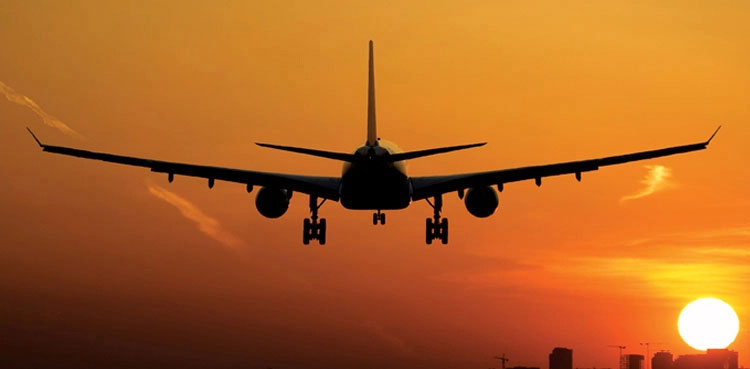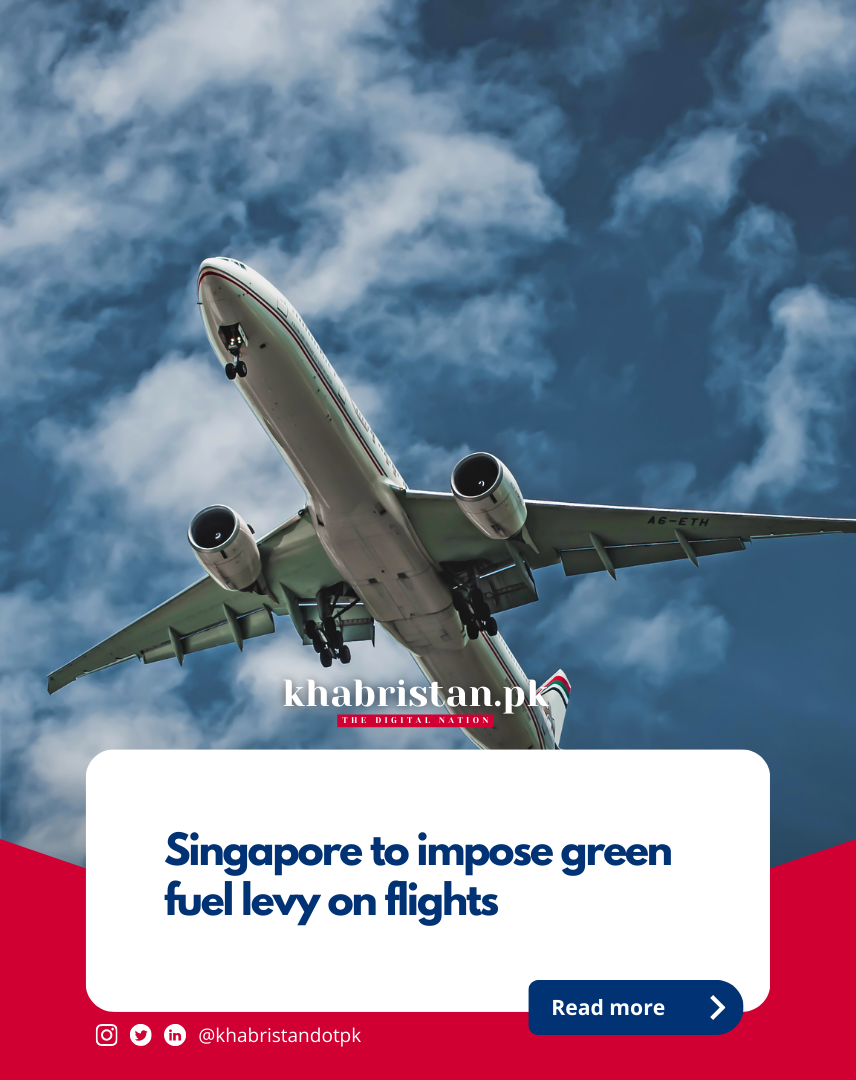Singapore plans to introduce a green fuel levy on flight tickets to support the transition to sustainable aviation fuel (SAF). The levy will vary based on factors such as flight distance and travel class, with a goal for departing flights to use 1-5% SAF by 2030. The aviation industry aims for net zero emissions by 2050.

Travellers will need to bear the cost of the transition towards green jet fuel, Singapore’s transport minister said as he announced the city state’s plans for a levy on flight ticket prices as the aviation industry seeks a viable funding model.
The plans announced at an industry summit on the eve of the Singapore Airshow aim for all departing flights to use 1% sustainable aviation fuel (SAF) from 2026, rising to 3-5% by 2030, subject to global developments and the wider availability and adoption of SAF.
“It will hurt our air hub and our economy, and raise the cost of travel for passengers if we are overly ambitious with our sustainability goals,” Transport Minister Chee Hong Tat said of the need for modest targets initially.
Aviation produces about 2% of the world’s emissions but is considered one of the hardest sectors to decarbonise.
European regulators have been the most active in trying to boost the use of SAF, introducing rules that force airlines to meet minimum requirements for its use. Fuel suppliers are obliged to ensure 2% of fuel at EU airports is SAF by 2025, rising to 6% in 2030 and 70% in 2050.
Under the European model, the carrier pays for the blended fuel and decides whether the cost will be passed on to passengers in ticket prices.
Singapore’s levy will vary based on factors such as the flight distance and travel class.
For example, in 2026 the price of economy class tickets on direct flights from Singapore to Bangkok, Tokyo and London will rise by by an estimated S$3 ($2.23), S$6 and S$16 respectively to pay for the SAF, said the Civil Aviation Authority of Singapore, which developed the plan in consultation with industry and other stakeholders.
But if SAF prices rise throughout the year, Singapore will not have raised enough cash from the levy – the level of which is set at the start of the year – to fund the full 1% and it could miss target, Tat said.
SAF, which can be made synthetically or from biological materials such as used cooking oil or wood chips, currently accounts for 0.2% of the jet fuel market and costs up to five times more than conventional jet fuel.
“A big challenge that is contributing to the high costs is actually securing bio-derived feed,” said Ong Shwu Hoon, Asia Pacific fuels vice president at ExxonMobil Asia Pacific.
HIGH COSTS
Singapore’s only current SAF producer, Neste, has capacity of up to 1 million metric tons of the fuel per year at the Singapore refinery that began operations last year, a company representative said. That is more than 10 times the volume required to the reach the 2026 target.
Neste produced 251,000 tons of SAF globally in 2023, its most recent financial report said.
The aviation industry says SAF use needs to rise to 65% by 2050 as part of plans to reach “net zero” emissions by then, though that will require an estimated $1.45 trillion to $3.2 trillion of capital spending.
“There will be a cost associated with transitioning to net zero. And ultimately that cost will have to be reflected in the ticket prices that we charge our customers, which will have a dampening effect on the level of growth,” IATA Director General Willie Walsh said at the Singapore summit.
IATA, which represents about 320 airlines, estimates that the global airline industry will grow at about 3.3% per year over the next 20 years, significantly lower than between 2010 and 2019, because of environmental challenges and supply chain issues, Walsh said.
Walsh also said that taxation to pay for aviation sustainability measures might not reduce the number of flights but could price some people out of flying and lead to empty seats, which is not good for the environment.
“It’s got to be a conversation: economics and viability, and environment sustainability,” Walsh said.
Luis Felipe de Oliveira, director general of Airports Council International, said governments need to invest in new SAF refineries to help bring down the cost.
“The solution is not capacity restrictions, the solution is not taxation; the solution is finding ways that you can work together to increase production that will then be used by the airlines in the system,” he said.
Sustainability will be a key theme at the Singapore Airshow, which opens on Tuesday.
During the show, Airbus will fly its A350-1000 widebody aircraft with a 35% blend of SAF supplied by Shell Aviation and made with cooking oil and tallow.
Singapore Airlines’ Chief Sustainability Officer, Lee Wen Fen, said that the use of modern planes to replace older jets that use more fuel is the most effective option while the industry waits for SAF production to ramp up.
($1 = 1.3446 Singapore dollars)
Singapore has recently announced a landmark decision to impose a green fuel levy on flights, signaling a pivotal step towards addressing environmental concerns in the aviation industry. The move comes as part of the government’s commitment to reducing carbon emissions and promoting sustainable practices in the air travel sector. This progressive initiative aligns with international efforts to mitigate the environmental impact of air transport and underscores Singapore’s dedication to embracing eco-friendly solutions. The green fuel levy is designed to incentivize airlines to adopt cleaner and more sustainable fuel alternatives, paving the way for a greener and more responsible aviation ecosystem. By encouraging the use of environmentally friendly aviation fuels, Singapore aims to contribute to global efforts in combating climate change and fostering a more sustainable future for the aviation industry. The introduction of the green fuel levy represents a significant stride towards achieving a more environmentally conscious and sustainable aviation sector, setting a positive precedent for other countries to follow suit in addressing the pressing environmental challenges associated with air travel.
Source: ARY NEWS
Singapore, green fuel levy, flight ticket prices, sustainable aviation fuel (SAF), aviation industry, European model, carbon emissions, decarbonisation efforts, European regulations, blended fuel, fuel suppliers, travel class, flight distance, Civil Aviation Authority of Singapore, ExxonMobil Asia Pacific, Neste, net zero emissions, IATA Director General, environmental challenges, supply chain issues, Airports Council International, SAF refineries, Singapore Airshow, Airbus A350-1000, Singapore Airlines, Chief Sustainability Officer.
Singapore will implement a green fuel levy on flight tickets to fund the transition to sustainable aviation fuel (SAF). The levy will vary based on factors like flight distance and travel class. The aviation industry seeks to increase the use of SAF to reduce carbon emissions. The European model, which requires minimum SAF use by airlines, serves as a reference for Singapore’s approach. High costs and sourcing challenges for SAF production pose significant hurdles. The industry estimates substantial capital spending to achieve net zero emissions by 2050. Sustainability will be a key focus at the upcoming Singapore Airshow, with an emphasis on using modern aircraft and increasing SAF production.
Disclaimer:
This content is AI-generated using IFTTT AI Content Creator. While we strive for accuracy, it’s a tool for rapid updates. We’re committed to filtering information, not reproducing or endorsing misinformation. – Khabristan.pk for more information visit privacy policy








Leave a Comment